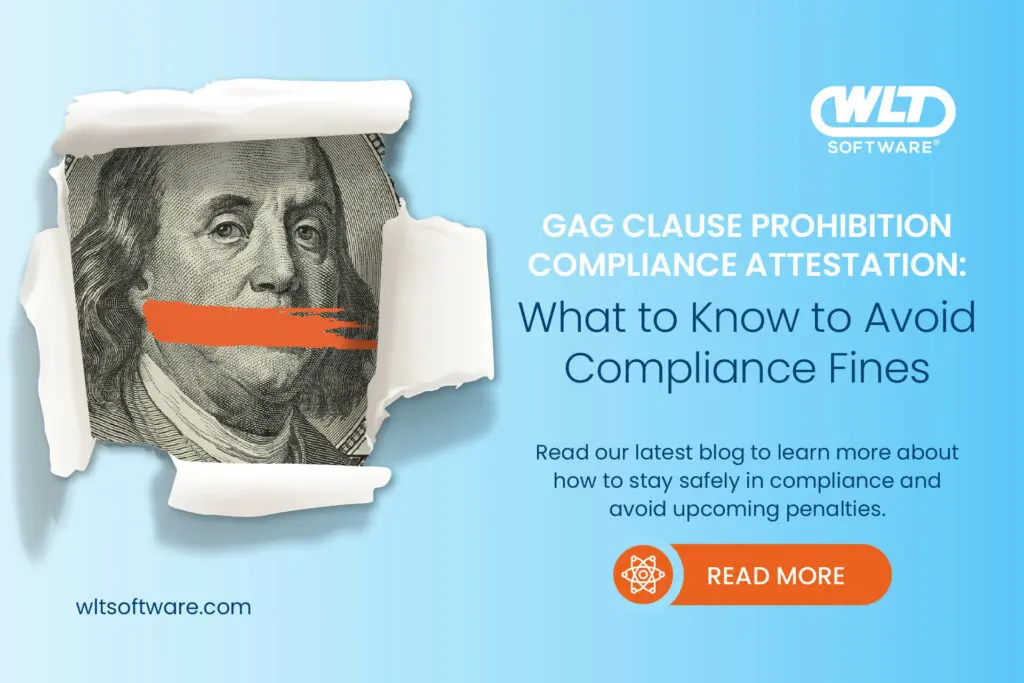The ConnXion – Volume 1, Issue 10
Since the Consolidated Appropriations Act (CAA) was passed in 2021, billing and transparency in health care has changed dramatically. The majority of these changes are for the better, of course, with the Transparency in Coverage (TiC) Rule and the No Surprises Act (NSA) establishing protection for patients who might otherwise be facing high medical bills from seemingly out of nowhere.1
But when it comes to keeping in compliance, these changes can pose a hassle to keep up with, if not a daunting challenge. At WLT, we pride ourselves on our ability to handle new situations efficiently and capably, all while keeping you informed and safely in compliance. And with the latest update upon us, the Gag Clause Prohibition Compliance Attestation (GCPCA), we’re here to bring you the highlights of what you need to know to avoid choking on those compliance fines.
What is Gag Clause Attestation?
Let’s start with the obvious question—what is the Gag Clause, exactly? High level, it’s an attestation of compliance with Internal Revenue Code section 9824, ERISA section 724, and several other sections under the CAA as applicable.2 More simply, it is a contractual provision that prohibits group health plans and health insurance issuers from disclosing cost or quality of care information to another party. As the name suggests, health insurance issuers cannot enter into an agreement containing a gag clause. Under the GCPCA, plans and issuers are required to submit an attestation of their compliance with the prohibition annually.3
Why should you be concerned?
Like other compliance requirements under the CAA, non-compliance means some kind of fine is coming your way—and the GCPCA is no exception. Failing to file the required attestations can result in enforcement action, which will potentially include penalties such as a $100 per day excise tax under the Internal Revenue Code or civil penalty under ERISA.4 While the exact penalties haven’t been specified, the $100 fine per day seems the most likely consequence—though it’s always smart to prepare for worse. Regardless of what the final penalties are, avoiding them is the best course of action, particularly with how quickly they can add up.
How should you prepare?
Technically, the Gag Clause laws have been in effect since December of 2020, when the CAA was signed into law. However, enforcement of the attestation requirements was delayed, which is
why it’s only just now coming into effect. The deadline for the first attestation is December 31, 2023, and it must cover the period between December 27, 2020, until then. Annual attestations must be made by December 31 each year, beginning in 2024.5
Plans and issuers must submit attestations online through the Centers for Medicare & Medicaid Services (CMS). Fortunately, it’s fairly simple after that, and both the CMS and GCPCA websites provide thorough instructions on how to complete attestations. The most crucial part of the process is making the deadline—so keep your eyes on the calendar.
At WLT, we pride ourselves on providing steadfast service that makes sure you’re safely in compliance. As the health space and government regulations continue to evolve, we’re here to support you with comprehensive, proven, and future-facing solutions to keep you moving full-speed ahead—without choking on any compliance penalties.
Learn more about how WLT’s systems keep you safely in compliance: https://wltsoftware.com/a-few-answers-on-reference-based-pricing/
References:
- https://www.cms.gov/marketplace/about/oversight/other-insurance-protections/consolidated-appropriations-act-2021-caa#:~:text=The%20Consolidated%20Appropriations%20Act%2C%202021,and%20transparency%20in%20health%20care.
- https://www.cms.gov/marketplace/about/oversight/other-insurance-protections/gag-clause-prohibition-compliance-attestation
- https://www.bradley.com/insights/publications/2023/07/making-the-first-gag-clause-attestations-a-quick-reference-guide
- https://www.ballardspahr.com/insights/alerts-and-articles/2023/07/gag-clause-attestations-due-by-end-of-year
- https://hios.cms.gov/HIOS-GCPCA-UI
